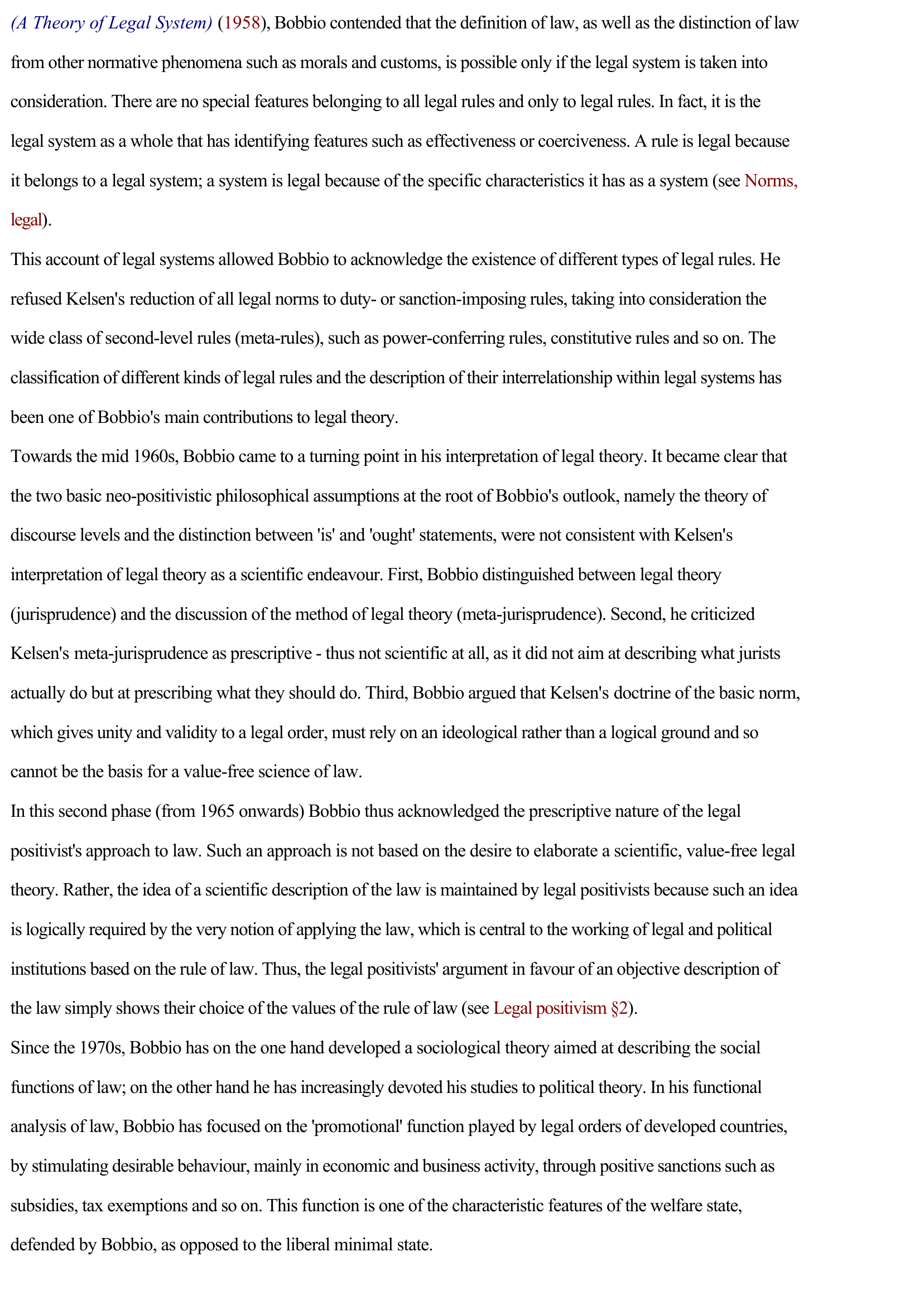Bobbio, Norberto
Publié le 22/02/2012

Extrait du document
«
(A Theory of Legal System) (1958 ), Bobbio contended that the definition of law, as well as the distinction of law
from other normative phenomena such as morals and customs, is possible only if the legal system is taken into
consideration.
There are no special features belonging to all legal rules and only to legal rules.
In fact, it is the
legal system as a whole that has identifying features such as effectiveness or coerciveness.
A rule is legal because
it belongs to a legal system; a system is legal because of the specific characteristics it has as a system (see Norms,
legal ).
This account of legal systems allowed Bobbio to acknowledge the existence of different types of legal rules.
He
refused Kelsen 's reduction of all legal norms to duty- or sanction-imposing rules, taking into consideration the
wide class of second-level rules (meta-rules), such as power-conferring rules, constitutive rules and so on.
The
classification of different kinds of legal rules and the description of their interrelationship within legal systems has
been one of Bobbio's main contributions to legal theory.
Towards the mid 1960s, Bobbio came to a turning point in his interpretation of legal theory.
It became clear that
the two basic neo-positivistic philosophical assumptions at the root of Bobbio's outlook, namely the theory of
discourse levels and the distinction between 'is' and 'ought' statements, were not consistent with Kelsen 's
interpretation of legal theory as a scientific endeavour.
First, Bobbio distinguished between legal theory
(jurisprudence) and the discussion of the method of legal theory (meta-jurisprudence).
Second, he criticized
Kelsen 's meta-jurisprudence as prescriptive - thus not scientific at all, as it did not aim at describing what jurists
actually do but at prescribing what they should do.
Third, Bobbio argued that Kelsen 's doctrine of the basic norm,
which gives unity and validity to a legal order, must rely on an ideological rather than a logical ground and so
cannot be the basis for a value-free science of law.
In this second phase (from 1965 onwards) Bobbio thus acknowledged the prescriptive nature of the legal
positivist's approach to law.
Such an approach is not based on the desire to elaborate a scientific, value-free legal
theory.
Rather, the idea of a scientific description of the law is maintained by legal positivists because such an idea
is logically required by the very notion of applying the law, which is central to the working of legal and political
institutions based on the rule of law.
Thus, the legal positivists' argument in favour of an objective description of
the law simply shows their choice of the values of the rule of law (see Legal positivism §2 ).
Since the 1970s, Bobbio has on the one hand developed a sociological theory aimed at describing the social
functions of law; on the other hand he has increasingly devoted his studies to political theory.
In his functional
analysis of law, Bobbio has focused on the 'promotional' function played by legal orders of developed countries,
by stimulating desirable behaviour, mainly in economic and business activity, through positive sanctions such as
subsidies, tax exemptions and so on.
This function is one of the characteristic features of the welfare state,
defended by Bobbio, as opposed to the liberal minimal state..
»
↓↓↓ APERÇU DU DOCUMENT ↓↓↓
Liens utiles
- Benedetto Croce par Norberto Bobbio Professeur de philosophie et de droit à
- Bobbio, Norberto - philosophie.
- Biographie de BOBBIO (Norberto).

































